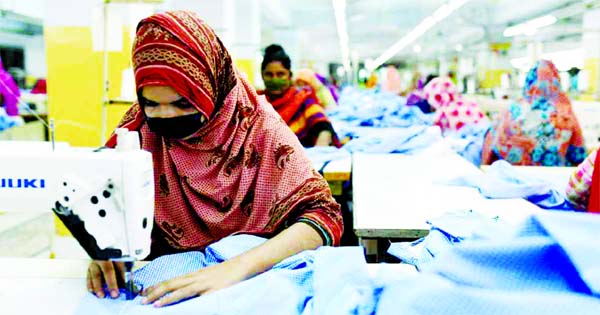
BSS, Dhaka :
The impact of COVID-19 on women in the garment industry has worsened due to underlying challenges, including discrimination and harassment, underrepresentation of women’s voice, wage gaps as well as unevenly shared unpaid care and family obligations, says a new brief from the International Labour Organization (ILO).
Entitled ‘Gendered impacts of COVID-19 on the garment sector’ the brief aims to raise awareness of the gendered reality of COVID-19 and to outline how the pandemic impacts women and men workers in the garment sector, according to an ILO webpost.
“Women account for approximately 80 percent of the garment sector workforce, so they are heavily affected to start with by many of the impacts of the COVID-19 pandemic. However, women also experience additional impacts due to the existing challenges they face in the workplace as well as expectations regarding women’s obligations in the home,” said Joni Simpson, Senior Gender Specialist for the ILO’s Regional Office for Asia and the Pacific.
Recent ILO research highlighted how major buying countries’ imports from garment-exporting countries in Asia had dropped by up to 70 percent in the first half of 2020, due to COVID-19. This has led to a sharp increase in worker layoffs and dismissals while factories that have reopened are often operating at reduced workforce capacity.
The Asia-Pacific region employed an estimated 65 million RMG workers in 2019, accounting for 75 percent of all garment workers worldwide.
In a study conducted on garment workers in Bangladesh, Cambodia, Kenya, Lesotho and Viet Nam, ILO’s Better Work project found that waged employment helped advance women’s empowerment in societies considered to be highly gender.
The impact of COVID-19 on women in the garment industry has worsened due to underlying challenges, including discrimination and harassment, underrepresentation of women’s voice, wage gaps as well as unevenly shared unpaid care and family obligations, says a new brief from the International Labour Organization (ILO).
Entitled ‘Gendered impacts of COVID-19 on the garment sector’ the brief aims to raise awareness of the gendered reality of COVID-19 and to outline how the pandemic impacts women and men workers in the garment sector, according to an ILO webpost.
“Women account for approximately 80 percent of the garment sector workforce, so they are heavily affected to start with by many of the impacts of the COVID-19 pandemic. However, women also experience additional impacts due to the existing challenges they face in the workplace as well as expectations regarding women’s obligations in the home,” said Joni Simpson, Senior Gender Specialist for the ILO’s Regional Office for Asia and the Pacific.
Recent ILO research highlighted how major buying countries’ imports from garment-exporting countries in Asia had dropped by up to 70 percent in the first half of 2020, due to COVID-19. This has led to a sharp increase in worker layoffs and dismissals while factories that have reopened are often operating at reduced workforce capacity.
The Asia-Pacific region employed an estimated 65 million RMG workers in 2019, accounting for 75 percent of all garment workers worldwide.
In a study conducted on garment workers in Bangladesh, Cambodia, Kenya, Lesotho and Viet Nam, ILO’s Better Work project found that waged employment helped advance women’s empowerment in societies considered to be highly gender.

